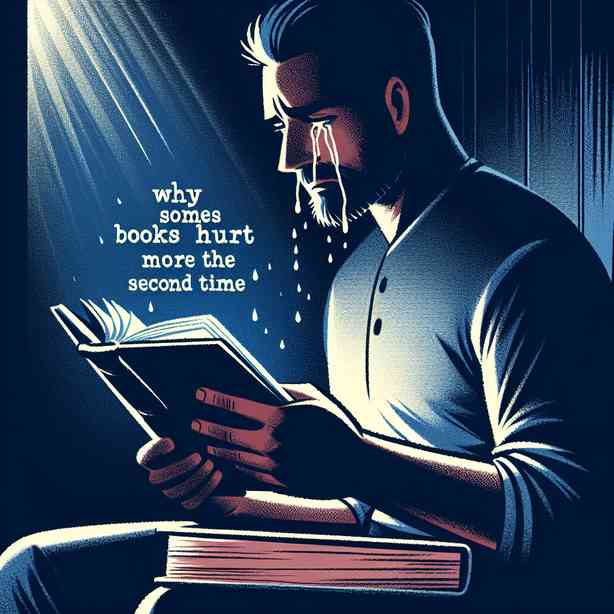
Books often hold deep emotional significance, serving as vessels for ideas, experiences, and feelings that resonate with readers. When we revisit these works, the experience can profoundly differ from our initial reading. Understanding why some books hurt more the second time around involves exploring the emotional, psychological, and contextual factors that influence our interactions with literature.
The first time we engage with a book, we are often swept away by the plot and characters. We become engrossed in the unfolding story, and our focus is frequently on the journey rather than the destination. This initial reading is often marked by a sense of discovery; we are not yet aware of the twists and turns that await us, which can create a thrilling and captivating experience. However, during subsequent readings, we already know the outcomes and can anticipate the events as they unfold. This familiarity alters our perspective and often deepens our emotional response.
One key element in this shift is nostalgia. Returning to a book reminds us of the time we first read it and the feelings we experienced at that moment. Familiar passages might evoke vivid memories, and we may find ourselves reflecting on how our lives have changed since that initial encounter. This introspective process can elicit strong emotions, particularly if the book’s themes resonate with our current life circumstances. For instance, a story about loss may hit harder if we are grappling with similar feelings in our own lives, making the reading experience more painful the second time.
Additionally, with each reading, we bring our evolving selves to the text. As we grow and gain new experiences, our perspectives naturally shift. This change can heighten our awareness of the deeper themes within the book. For example, as we age, we might develop a greater understanding of complex emotional relationships, making certain passages more poignant than they were before. What once seemed like a simple adventure might now unveil layers of complexity, revealing uncomfortable truths about love, betrayal, or personal identity. This enriched comprehension can make the narrative more impactful and, at times, deeply hurtful.
Moreover, revisiting books often invites us to confront our unresolved feelings or experiences. The narratives we engage with can act as mirrors, reflecting our internal struggles and fears. When we read a story about heartbreak, for instance, we might find ourselves grappling with our own past relationships during that second reading. This confrontation can unleash a torrent of emotion that we might have been able to mask during the first reading, when we were absorbed in the plot and characters rather than our responses to them.
Another crucial aspect is the evolution of societal and cultural contexts. Literature exists within moments that shape its themes and messages. As societal norms and values shift, reading the same book can bring new interpretations to light. Consider how a novel that once seemed merely entertaining may, upon a second reading, reveal unsettling truths about inequality, injustice, or privilege. This awareness can provoke discomfort and sadness, as readers reconcile their previous ignorance with a newfound understanding of the complexities woven into the narrative.
Psychological factors also play a role in this dynamic. The concept of emotional memory suggests that our past experiences can influence our emotions in the present. When we revisit a book that once stirred our hearts, we may not only remember the story but also our emotions from that time. This linkage can intensify the feelings we associate with the text, causing us to relive certain traumas or joys. Consequently, the emotional charge felt during a second reading can be amplified, leading to a more profound experience that can, at times, be painful.
Furthermore, the act of rereading invites us to engage more fully with the book’s language, style, and structure. We may notice subtleties we missed before, such as nuances in character development or foreshadowing that contribute to the overall impact of the story. This deeper analysis can elicit discomfort, especially if we find ourselves challenged by the author’s decisions or by the moral dilemmas faced by the characters. Such realizations can heighten our emotional engagement with the text, leaving us with a lingering sense of unease or sorrow.
In addition to personal engagement, the influence of community and conversation around a book can also transform our reading experience. Discussions with others about a particular work might highlight aspects of the narrative that we hadn’t considered previously. Insightful critiques or differing interpretations can allow us to view the text from fresh angles, sometimes bringing painful truths to the forefront. The collective exploration of a book can enhance its emotional impact, as shared experiences and interpretations resonate across different readers.
Lastly, timing matters. The context of our lives when we choose to revisit a book can greatly affect our emotional response. Life events—such as grief, joy, change, or turmoil—can influence how we interpret the themes within a story. We may find that a book that once felt comforting now feels piercingly sad due to changes in our own circumstances. This shift in personal context underscores the idea that literature is not static; it evolves alongside our lives and experiences.
In conclusion, the emotional depth and complexity of reading a book can change significantly from the first encounter to subsequent readings. Nostalgia, personal growth, societal context, emotional memory, language engagement, community influence, and individual timing all contribute to this phenomenon. Understanding why some books hurt more the second time serves as a reminder of the profound connection between literature and human experience. By delving into these factors, readers can appreciate the nuances of their emotional journeys, finding strength in the vulnerability that comes with revisiting the written word. Embracing the pain alongside the beauty of these narratives allows us to grow, reflect, and ultimately gain greater insight into ourselves and the human condition.


